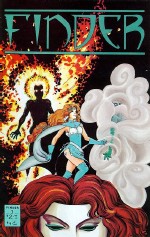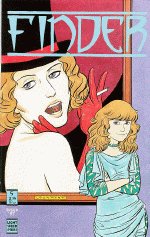| Finder
Crawl around
the backlots of the internet and you'll find one comic pop up
on almost every comic fansite or webzine, that somehow you've
never seen in a comic book store. That book is Finder.
My search
for it started one or two years ago, when I happened to catch
an article over at Ninth
Art listing the best science fiction comics to be read.
Somewhere down the page, I read a blurb about Finder
that told me barely anything about the plot, but the name
somehow stuck with me. "Finder…" It just rolls
off the tongue. I also noticed that the comic was written
and drawn by a woman by the name of Carla Speed-McNeil. Women
writers and artists being rare in the comic book industry,
I was doubly intrigued.
So, I
checked with my local comic shop, which didn't have a copy.
Figuring I was simply unlucky, I next went to a bookstore,
hoping the ever-growing graphic novel section would contain
this much-sought volume, and that it wouldn't be blocked by
the ever-expanding encroachment of the manga section. And
there was no Finder to be found.
Over the
next few months, I would duck into a comic or hobby shop and
while perusing, I would always check for a copy. They never
had one. Later, I thought to ask about ordering one from the
distributor: my comic shop couldn't get it from Diamond for
some reason, bookstores had never carried it and couldn't
order it, and damn me if I couldn't find a website to PayPal
my way to reading enjoyment. Even e-Bay refused me. (You're
asking yourself, "Why didn't he check Amazon?" Because
sometimes, even I am a dumbass.)
And then
it was just there one day, sitting on the rack of a comic
shop in New York, which I just happened to have a gift certificate
for. (Divine Intervention? Jesus was standing there pointing
to the rack…practically.) I was so shocked; I almost
forgot to bring the damn thing up to the counter. I was afraid
that after all that searching, reading the comic would somehow
lack in cathartic release.
It's good
to be wrong.
Finder
is probably the best science fiction comic out there, and
it is definitely one of the finest examples of comic book
crafting to come out of both the modern publishing era and
the small press. It's a ridiculously immersing work that pays
close attention to detail and boasts more storytelling hooks
than a Pulitzer reception.
The story
revolves around Jaeger, and I say revolves because the story
seems to simply happen around him as well as to him. Jaeger
is the product of a series of army experiments that attempted
to make a better soldier for the world of the future. He's
strong, resilient, heals quickly, and is about as moral as
a bag of frosted animal crackers. He is one of the few people
that can survive out in the barren wastelands of the future:
dry plains decimated by war and perhaps another factor as
yet unseen. The only cities left are domed cities or "cynosures,"
providing protection from the harsher elements, and centers
of civilization. Jaeger returns from the desert to Anvard,
the city where he sells whatever he can find out in the wastelands.
In returning to the city, he comes into contact with a bevy
of characters, most notably the Grosevnor family. The Grosevnors,
all women, are in hiding from their abusive patriarch, and Jaeger
stops in to crash whenever he needs a warm couch (or in this
case, a warm kitchen floor and a throw pillow).
It's hard
to talk about this book because of the level of detail that
Speed-McNeil puts into it. While I've marveled before about
some writers' abilities to world-build, I've never seen one
make world-building so subtle a thing.
She gently
weaves the various cultural and societal aspects of the future
into a slow, but ultimately rich narrative. She pulls and
borrows from several cultures to create this future: Indian
pantheons and class systems go hand in hand with Islamic overtones
and trappings of Native American myth, and they all seem to
fit in fine with a future that features anthropomorphic animals
walking around as regular citizens.
The characters
themselves are just as rich and McNeil deserves high honors
for her character work. She injects characters like Jaeger,
who is amoral and fairly indifferent to the consequences of
his actions, into the story and lets the reader watch him
subtly change over the course of the book. McNeil never makes
her characters good or evil, but makes them human. When we
first get introduced to Emma, we assume she is the regular
single mother of three girls working hard for her money. When
she tells us the stories of abuse about her ex-husband Brig,
she is empathetic and believable. But later, when certain
points arise that make us question Emma's mere sanity.
McNeil
allows the reader to form opinions about the characters she
writes, and then smashes the preconceptions. McNeil writes
as if she were sure exactly what the reader was going to infer
from her story, and then shortly throws the leader for a loop.
When we first encounter the character of Brig, it's hard to
believe that this man is the controlling monster he is made
out to be. In fact, by the end of the first volume, the entire
situation between Brig and Emma is one of the most complex
relationships ever portrayed in a comic book. The reader is
not sure who is telling the truth, or whose story is a fabrication,
leaving a state of ambiguity that creates a need for assurance.
That assurance never comes, and the reader is left to question
the text. While this might frustrate some, I was happily blown
away when I read this, noting the depth it adds to the story.
McNeil
also crafts some very good visual scenes (usually a staple
of the writer-artist hyphenate). Her artwork is gorgeous and
I could only compare it to Judd Winick's cartoonish style,
only not cartoonish. Realism seems to be prevalent throughout
every panel: human expressions are all there, showing off
emotion after emotion. The placement of the characters in
the panels is expert, as McNeil seems to be able to create
a distinct sense of body language. Jaeger moves in a recognizable
feline capacity, his movements graceful and not wasting a
step. Emma and two of her children all move in a subdued shuffled
kind of way, while the older daughter (teenager) moves around
like an over-eager jack rabbit (note: rabbit reference does
not only apply to basic movement, the girl is horny like most
teens). Even Brig has a slow and careful quality to his movement
that suggests time spent in prison.
McNeil's
grasp of architecture and structure is excellent and she also
accents the artwork with good attention to detail. Every face
of one of the various clans in the city of Anvard has marking
indicating rank and class and such, and McNeil spent the time
to make them unique visuals, no just bad photo referencing
of tribal paint. McNeil also does great work with her use
of negative space in the oracle scene, and uses some odd angle
shots to keep the reader interested (I will never get tired
of the full page, overhead shot in a comic book, because it
shows just how dynamic the artwork can really be).
I've
barely scraped the surface of everything that's good in the
book. It's rare to find a comic that possesses so much depth
and meaning. There's a thousand plot threads to work through,
subplots that are explored (and continued in later volumes
I assume), with a cast of characters that are possessed of
good dialogue and even better characterization.
McNeil
has created Masterpiece-level work here. She treats the love
scenes with tenderness and her human scenes with all the emotional
ranges. Sin-Eater is a quintessential comic to add
to your collection. Speed-McNeil actually footnotes every
page in the appendix of the book, giving the reader valuable
insight into the world she created. It sometimes reads like
actual history (actual fictional history that is; wouldn't
want to mix-up my realities…again).
So now,
after reading and loving the first one, I will begin my journey
to obtain volume two. Hopefully, it will cost the same or
less than $15.95, as its predecessor did, so I can afford
this junkie habit of a comic book series McNeil has concocted.
My journey begins now…well…okay now…damn. I
need some sherpas.
|







